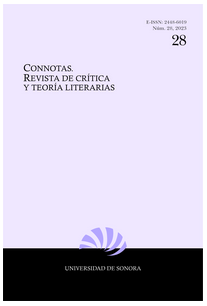Representations of abject corporality in narrative about Central American migration in Mexico
DOI:
https://doi.org/10.36798/critlit.vi19.287Keywords:
Central American migration, violence, abyection, necropolitics, body studiesAbstract
This paper explores and analyses the representation of Central American migrant characters in the Mexican novels La fila india (2013) by Antonio Ortuño, Alejandro Hernández's Amarás a Dios sobre todas las cosas (2013) and, Emiliano Monge's Las tierras arrasadas (2015). The study focuses on the configuration of corporality, the construction of otherness and social distancing based on xenophobia and the relationship of hate speech to political, structural and symbolic violence. From Achille Mbembe´s idea of necropolitics and Julia Kristeva´s concept of abyection, it is possible to draw several readings on the dynamics of the migrant body´s aggression, as well as Mexican society assimilation of violence, and their literary representation within the past five years. These can be interpreted as criticism of the fragile policies regarding the protection of migrants’ human rights and, the normalization of violence in both discourse and practice. This analysis seeks to emphasize the logics of power in the exercise of aggression and the invisibilization of the migrant addressed by these writers.
Downloads
References
Bourgois, Philippe. The power of violence in war and peace Post-Cold War lessons from El Salvador. Sage Publications, 2001. DOI: https://doi.org/10.1177/14661380122230803
Chávez-Flores, Ian Yetlanezi. “Mythos y logos: hacia un análisis de la migración contemporánea en La fila india, de Antonio Ortuño”. La Colmena, 2018, pp. 35-46.
Franco, Jean. Cruel Modernity. Duke University, 2013. DOI: https://doi.org/10.1515/9780822378907
Hernández, Alejandro. Amarás a Dios sobre todas las cosas. Tusquets, 2013.
Kristeva, Julia. Poderes de la perversión. Siglo XXI Editores, 2006.
Levi, Primo. Trilogía de Auschwitz. Traducido por Pilar Gómez Bedate, Editorial Océano, 2005.
López-Acosta, Adriana. “Este horror [la violencia contra los migrantes] trasciende la realidad”. Cruce, 11 abril 2014, cruce.iteso.mx/este-horror-la-violencia-contra-los-migrantes-trasciende-la-realidad/
Mbembe, Achille. Necropolítica. Traducido por Elisabeth Falomir Archambault, Melusina, 2011.
Monge, Emiliano. Las tierras arrasadas. Random House, 2015.
Ortuño, Antonio. La fi la india. Océano, 2013.
Parra, Eduardo Antonio. “Vergüenza”. Letras Libres, julio 2013, letraslibres.com/mexico/libros/verguenza.
Porcel, Beatriz. “Deshumanización del cuerpo, desaparición, muerte”. Revista Ecopolítica, no. 9, 2014, pp. 13-24.
Sales Gelabert, Tomeu. “Lo humano, la deshumanización y la inhumanidad; apuntes filosófico-políticos para entender la violencia y la barbarie desde J. Butler”. Análisis. Revista de Investigación filosófica, no. 2, 2015, pp. 49-61. DOI: https://doi.org/10.26754/ojs_arif/a.rif.20151922
Shrimpton, Margaret, David Loría, Celia Rosado, editores. Cuerpos abyectos: infancia, género y violencia. Universidad Autónoma de Yucatán, 2017.
Taylor, Diana. Disappearing Acts. Spectacles of Gender and Nationalism in Argentina’s “Dirty War”. Duke University Press, 1997. DOI: https://doi.org/10.1215/9780822399285
____. The Archive and the Repertoire: Performing Cultural Memory in the Americas. Duke University Press, 2003.
Varela, Amarela. “La trinidad perversa de la que huyen las fugitivas centroamericanas: violencia feminicida, violencia de estado y violencia de mercado”. Debate feminista, 2017, pp. 1-96. DOI: https://doi.org/10.1016/j.df.2017.02.002
Downloads
Published
How to Cite
Issue
Section
License
The authors always maintain the moral and patrimonial rights of their work. They only grant the non-exclusive license of use to Connotas for their first publication. Therefore, the authors may make other independent and additional contractual agreements for the publication of their article, review or other text originally published in Connotas or with modifications (including the title) as long as they clearly indicate that the paper was first published in Connotas. Revista de crítica y teoría literarias. Connotas undertakes not to make commercial use of the texts it receives or publishes.
See also "Copyright and Licences".









